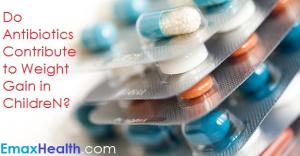By Tim Boyer G+
Dr. Oz’s new episode takes a look at what antibiotics may be doing to the human body besides helping to heal.
Farmers intentionally feed chicken and other livestock antibiotics to increase their size. But antibiotics may be doing the same thing to you posits Dr. Oz in a new episode of The Dr. Oz Show that takes a look at why antibiotics may be making you fat and could be the cause of your obesity.
“Today I’ve got breaking news. Experts are uncovering the hidden reason behind America’s obesity problem: Could you be gaining weight because of antibiotics that you take every day for problems like sore throats and earaches? Or from antibiotics found in our food? It’s an alarming finding, but it raises a simple question—are antibiotics making you fat?” asks Dr. Oz, who previously has discussed how certain natural cereals cause weight gain as well asmedications that can make you fat.
With Dr. Oz is special guest Dr. Martin Blaser, Director of the Human Microbiome Program at New York University who has spent years researching what he considers a suspicious association between weight gain and antibiotic use.
“Farmers have been using antibiotics to fatten up all of their livestock for decades now. And one day, I thought, if that’s working on the farm, what are we doing to our children? What are the antibiotics we are giving them, doing?”
One of Dr. Blaser’s first tests toward answering these questions was to see what would happen if antibiotics were fed to laboratory mice that are typically used as animal models for studying human disease. In his research, Dr. Blaser found that when comparing two groups of mice of which all were given the same amount and type of food but one group with added antibiotics and the other group without antibiotics, that the antibiotic fed mice gained 50% more fat.
Furthermore, when he extended his experiments to include mice being fed a high-fat diet, both groups became fat. However, those mice that were on a high-fat diet with antibiotics became even significantly fatter.
“Interestingly, for the women out there—this problem was more pronounced in female mice. The male mice didn’t have as big of a problem. They actually got more muscle as well as fat. Which may explain some of the differences we are seeing between the genders,” says Dr. Oz.
Dr. Blaser explains that not only does feeding antibiotics to these animals result in increased body fat, but that it also changes the bacteria in the gut—an important finding that could explain how antibiotics may cause weight gain.
Dr. Oz tells viewers that antibiotics could be affecting how much and how easily some of us gain weight due to 3 possible ways antibiotics may be changing our bodies:
Antibiotic-induced change #1: Antibiotics make you metabolize food differently
According to Dr. Oz, taking antibiotics may be selecting for certain bacteria that actually causes your body to retain more calories from eating a specific amount of food in comparison to normal gut bacteria that will cause your body to retain less calories from the same amount of food. In other words, your metabolism may be determined by the type of bacteria in your gut. And, being exposed to antibiotics may be selecting for the wrong type of bacteria that then causes increased calorie retention.
Antibiotic-induced change #2: Antibiotics can cause your cravings
Dr. Oz tells viewers that new research is finding that the type of bacteria you have in your gut may be responsible for feelings for cravings of certain high-calorie foods. Therefore, again, if antibiotics wipe out normal bacteria that do not induce cravings, antibiotics may then be selecting for bad bacteria that induce food cravings that lead to weight gain.
Antibiotic-induced change #3: Antibiotics increase the number of fat cells
“It turns out that antibiotics actually changes the number of fat cells in your body,” says Dr. Oz who explains that this is significant when you are young and your body is developing into one that has more fat cells in it than the body of someone who is young and not being exposed to antibiotics.
This point is supported by Dr. Blaser’s research that associates childhood antibiotic exposure with the potential for growing up into a fat adult.
“We studied a big group of kids, and some of them had antibiotics early in life and some of them didn’t. We looked at them when they were three, and then when they were seven. The kids who got antibiotics the first six months of life had higher indices of fat in both of those ages,” says Dr. Blaser. “What a kid’s weight is when they are five years old is a big determinant of what they are going to be like when they are fourteen. And fourteen is a big determinant of what they are going to be like when they are an adult.”
Dr. Blaser also points out that when it comes to antibiotic exposure from eating chicken that has been fed antibiotics, the previously held belief that the antibiotics are gone by the time you cook and eat the meat is not always true. He tells viewers that currently it is not known if antibiotic fed livestock have the same effect on us as antibiotics given to us directly during childhood.
Dr. Oz closes the episode by telling viewers that antibiotics are a necessary part of medicine when they are needed, but that too often they are over-prescribed. Dr. Oz recommends two things we can do for now about antibiotic exposure:
1. Stop demanding antibiotics from your doctor when you have a cold—they do not help.
2. Eat probiotics for two weeks beginning the first day of taking any antibiotic—to replenish the good bacteria in your gut.
“We don’t know if this is going to work, but for now that is a step [eating probiotic supplements] I would take prophylactically,” recommends Dr. Oz, who also discussed the importance ofprobiotics for weight loss in his new magazine.
For an informative article about losing belly fat through probiotics click-on the titled link, “Will Probiotics Really Help You Lose Your Belly Fat?”
The Dr. Oz Show


























































